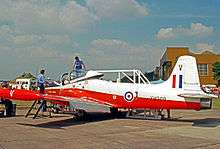No. 6 Flying Training School RAF
| No. 6 Flying Training School | |
|---|---|
| Active |
26 Apr 1920 - 1 April 1922 1 Apr 1935 - 22 Apr 1942 17 Dec 1945 - 30 Jun 1968 1 May 1970 - 31 Mar 1996 7 Sept 2015 - present |
| Country |
|
| Branch |
|
| Base | RAF Cranwell |
| Motto(s) | Latin: Aspice et Imitare |
| Aircraft | Grob Tutor T1 |
| Commanders | |
| Current commander | Group Captain Andrew (Chas) Dickens |
No. 6 Flying Training School RAF is a Flying Training School (FTS) within No. 22 (Training) Group of the Royal Air Force that delivers flying training to University Air Squadrons[1] and Air Experience Flights.[2]
History
The school was formed by renaming 39 Training School at RAF Spitalgate.
After moving from RAF Netheravon, the school became the first flying unit at RAF Little Rissington in August 1938 with Audaxes, Furies, Harts and Ansons as No. 6 Service Flying Training School. It was disbanded by being redesignated No.6 (P)AFU (Pilot-Advanced Flying Unit) on 22 April 1942.[3]
From 30 April 1946, 6 FTS was based at RAF Ternhill[4] equipped with North American Harvards, receiving Percival Prentices in late 1948; from July 1953 Percival Provost T1 piston engine training aircraft replaced both types.[5] However on 24 July 1961 the school moved out to RAF Acklington where it closed again on 30 June 1968.[6]

The School reformed 1 May 1970 at RAF Finningley, within No. 23 Group RAF as an Air Navigation School (ANS). This was an amalgamation of the Hawker Siddeley Dominie T.1 s of No.1 ANS from RAF Stradishall and the Varsities No.2 ANS from RAF Gaydon. Low level navigation training took place on the Jet Provost from August 1970, eventually using the T5B variant which had extra fuel capacity in the form of wingtip tanks due to the extra fuel burn at low level. This part of the school was known as the Low Level and Air Defence Training Squadron (LLADTS). The Vickers Varsity was phased out in 1976 making No.6 FTS an all-jet school.
During the 1960s and 1970s all the RAF's Colleges and Flying Training Schools had their own Jet Provost aerobatics team. One of the less known and publicised display teams was flown by 6 FTS. They flew a team for five seasons between 1962 and 1966 and it was unofficially christened the "Cocks O'the North".[7]
On 14 August 1993, the LLADTS made its final farewell to the Jet Provost in the navigation training role when four aircraft staged a "dying swan" formation over the airfield.
6 FTS also played host to the Multi-engine Training Squadron (METS) and was responsible for Operational Navigation training of all RAF multi-engine pilots, using twin-turboprop Handley Page Jetstream T1 aircraft. METS was granted the No. 45 (R) Squadron number plate in July 1992 before leaving 6 FTS and moving to 3 FTS at RAF Cranwell in October 1995.
The school was disbanded on 31 March 1996 with the closure of RAF Finningley.
Reformation
On the 7th September 2015, 6 FTS was reborn, to command and manage the University Air Squadrons and their associated Air Experience Flights located across the UK. This role was transferred from 3 FTS, due to the implementation of the Military Flying Training System. The Elementary Flying Training (EFT) in the Royal Air Force and the other services upgrades to the Grob G 120TP in 2017, while the University Air Squadrons and Air Experience Flights will remain on the Tutor T.1.[8]
The task of 6 FTS is also to ensure continual recruitment of UAS cadets into the Royal Air Force proper; those who do not join will have a better appreciation for the military, which they will take forward into their careers.
Current Units

- Bristol University Air Squadron
- 3 AEF
- East Midlands University Air Squadron
- 7 AEF
- Liverpool University Air Squadron
- Manchester and Salford Universities Air Squadron
- 10 AEF
- University of Wales Air Squadron
- 1 AEF
- Yorkshire Universities Air Squadron
- 9 AEF
With the reduction in the gliding fleet, MoD have announced they intend to create No.s 13 and 14 AEFs. No. 14 should be based in Northern Ireland.[9]
References
- ↑ "RAF University Air Squadrons". Royal Air Force. Retrieved 10 October 2015.
- ↑ http://www.raf.mod.uk/news/archive/6-flying-training-school-08102015
- ↑ http://www.wartimememoriesproject.com/ww2/airfields/airfield.php?pid=1790
- ↑ http://www.rafweb.org/Stations/Stations-T.htm
- ↑ Sturtivant, 1997, p. 153
- ↑ http://www.jetprovostfile.org/operating-units/
- ↑ http://www.jetprovostheaven.com/jpteams/
- ↑ "6 Flying Training School". raf.mod.uk. Royal Air Force. Retrieved 14 November 2015.
- ↑ "Air Cadet Aviation Relaunch:Written statement - HCWS605". MoD. Retrieved 10 March 2016.
- Bibliography
- Sturtivant, R.C. (1997). Royal Air Force Flying Training and Support Units. Air-Britain (Historians) Limited. ISBN 0-85130-252-1.
External links
- Flying Training Schools, Air of Authority.
| Wikimedia Commons has media related to No. 6 Flying Training School. |
